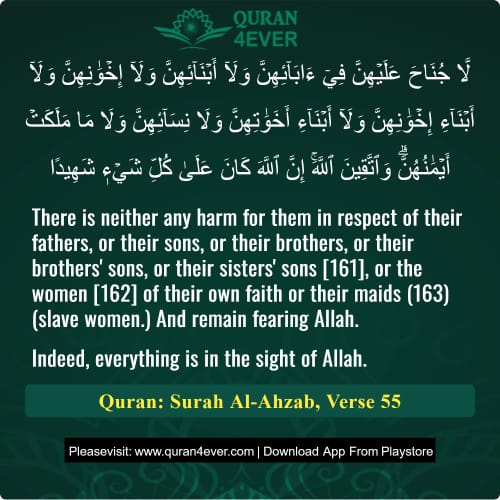
Transliteration:( Laa junaaha 'alaihinna feee aabaaa'ihinna wa laaa abnaaa'ihinna wa laaa ikhwaanihinnna wa laaa abnaaa'i ikhwaanihinna wa laaa abnaaa'i akhawaatihinna wa laa nisaaa'i hinna wa laa Maa malakat aimaanuhunn; wattaqeenal laah; innal laaha kaana 'alaa kulli shai'in Shaheedaa )
"There is neither any harm for them in respect of their fathers, or their sons, or their brothers, or their brothers' sons, or their sisters' sons, or the women of their own faith or their maids (slave women). And remain fearing Allah. Indeed, everything is in the sight of Allah." [33:55]
This verse outlines the specific maḥram (non-marriageable) male relatives before whom the wives of the Prophet ﷺ and all believing women may appear without observing strict privacy (ḥijāb). These include fathers, sons, brothers, nephews through brothers and sisters—relations where modesty boundaries are naturally relaxed due to familial closeness and lack of potential desire.
It also confirms that believing women are not required to maintain purdah (privacy) from one another. However, this does not extend to non-believing women, indicating the need for caution and covering in their presence.
The verse mentions that maidservants or female slaves may also be excluded from the command of ḥijāb. Some scholars interpret this as meaning a believing woman can appear unveiled before her slave girl, while others debate the level of privacy with male slaves. A narration from Sayyidah Aisha (RA) suggests she showed greater caution, even having her slave Zakwaan free himself after assisting in her burial, to avoid any doubt or breach of decorum.
The verse ends with a strong reminder: "Remain fearing Allah." Every action, whether private or public, is under divine observation, and believers are urged to conduct themselves accordingly, especially in matters related to modesty and gender interaction.
55. It is no sin on them before their fathers, or their sons, or their brothers, or their brother’s sons, or the sons of their sisters, or their own (believing) women, or their (female) slaves. And (O ladies) have Taqwa of Allah. Verily, Allah is Ever All-Witness over everything.
When Allah commands women to observe Hijab in front of men to whom they are not related, He explains who are the relatives before whom they do not need to observe Hijab. This is like the exceptions stated in Surat An-Nur, where Allah says:
(And not to reveal their adornment except to their husbands, or their fathers, or their husbands’ fathers, or their sons, or their husbands’ sons, or their brothers, or their brothers’ sons, or their sisters’ sons, or their women, or their right hand possessions, or the Tabi`in among men who do not have desire, or small children who are not aware of the nakedness of women.) (24:31). The Ayah contains more detail than this, which we have already discussed in the Tafsir of the Ayah and do not need to repeat here. Ibn Jarir recorded that Ash-Sha`bi and `Ikrimah said concerning the Ayah,
(It is no sin on them before their fathers…) I said, “What about the paternal uncle and the maternal uncle — why are they not mentioned” He said: “Because they may describe her to their sons, so it is disliked for a woman to remove her covering in front of her paternal uncle or maternal uncle.”
(or their own women,) means that they do not have to observe Hijab in front of other believing women.
(or their (female) slaves.) Sa`id bin Al-Musayyib said: “This means female slaves only.” This was recorded by Ibn Abi Hatim.
(And (O ladies) have Taqwa of Allah. Verily, Allah is Ever All-Witness over everything.) means, and fear Him in private and in public, for He witnesses all things and nothing is hidden from Him, so think of the One Who is always watching.
(33:55) It will not be blameworthy for the wives of the Prophet if their fathers, their sons, their brothers, their brothers’ sons, their sisters’ sons,[102] and the women with whom they have social relations,[103] and the persons whom their right hands possess enter their houses.[104] (O women), shun disobeying Allah. Allah is watchful over everything.[105]
102. For explanation, see (Surah An-Nur, ayat 31) note 38-42. Allama Alusi’s commentary in this connection is also noteworthy. He says, “Brothers and sons of brothers and sisters include all those relatives who are unlawful for a woman, whether they are blood relations or foster relations. This list does not mention the paternal and maternal uncles because they are like the parents to the woman, or perhaps they have been left out because there was no need to mention them after mentioning their sons, For the reason for not observing hijab from the brother’s son and sister’s son is the same as of not observing it from the paternal and maternal uncles.” (Ruh al-Maani).
103. For explanation, see (Surah An-Nur, ayat 31) note 44.
104. For explanation, see (Surah An-Nur, ayat 31) note 43.
105. It means this: “After the coming down of this absolute command no person outside the circle of the relatives, who have been made an exception, should be allowed to enter the houses without hijab being observed from them,” Another meaning is: “The woman should never adopt the attitude that they should observe hijab when the husband is present, but should appear without hijab before the other men, when he is away. Such a conduct may remain hidden from the husband but not from Allah.”
[1208]- It is permissible for a woman to appear before these people without complete covering and to be alone with them. The brothers of both parents (uncles) are included as "fathers" or "parents," according to ḥadīth.

For a faster and smoother experience,
install our mobile app now.
Related Ayat(Verses)/Topics